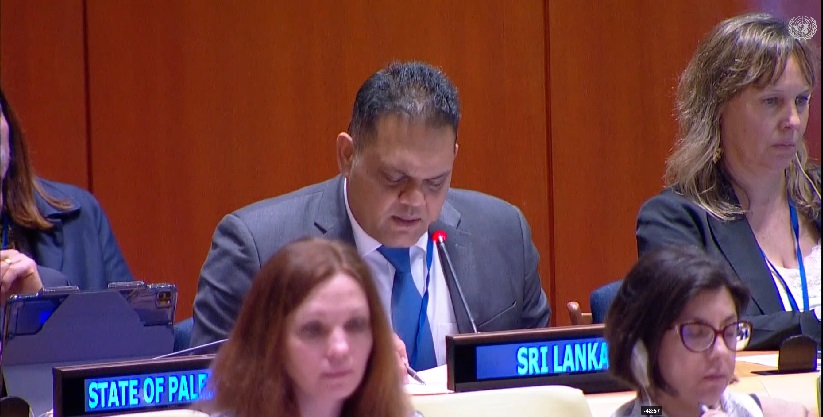
Statement by Mr. Shehan Semasinghe, State Minister of Finance of Sri Lanka
UN ECOSOC Financing for Development (FfD) Forum
17 – 20 April 2023
Madam Chair,
We meet at a time when the development agenda that we embarked on in 2015 seems to have regressed and is in danger of remaining unachieved in 2030. Even before the pandemic, the development agenda was somewhat constrained due to a multitude of factors. These factors have exacerbated due to a combination of events stemming from the pandemic to the conflict in Ukraine and climate change. Multilateralism and multilateral organizations as well as the process of globalization have today come under threat due to the perception that institutions committed to delivering the Development Agenda have not achieved their milestones. The lack of adequate and sustainable financing remains the primary and key challenge today that many states face in meeting the targets of the 2030 Agenda.
The key messages in the report on “Financing for Sustainable Development” provides a snapshot of the predicament we are in, the urgency of the action to be taken and the clear recommendations on what needs to be done. What remains to be seen is whether there is political will at the global level to take adequate measures, especially on reform of the international financial architecture, to meet already expressed pledges on Official Development Assistance, assist countries in debt restructuring and debt sustainability and ensure adequate climate financing.
Madam Chair,
I came to New York after attending the Spring Sessions of the IMF and the World Bank with whom we have an ongoing dialogue on the reforms being undertaken by Sri Lanka towards economic recovery, and the Extended Fund Facility approved last month. The Sri Lankan economy was faced with the devastating effects of the poly-crises that we face today. As observed by the UN Secretary-General, many developed countries, adopted expansionary fiscal and monetary measures to aid recovery in the aftermath of the pandemic. However, many developing countries could not do so and were burdened with high interest rates and lowered credit ratings. According to the UNDP’s Paper on “Avoiding ‘Too Little Too Late’ on International Debt Relief,” 54 countries are categorized as having severe debt problems given the global outlook of high inflation, low growth and high interest rates. Sri Lanka has had its share of challenges in recent times.
With the successful conclusion of negotiations with the IMF on an Extended Fund Facility, we have reason for optimism and are now engaged in a debt restructuring programme within a framework comprising of a Special Creditor Coordinator Committee comprising of India, France and Japan. My government is committed to making the hard policy decisions needed for the restitution of the economy on sound economic practices.
Madam Chair,
Our experience has shown us the constraints we face in the existing system of the debt architecture, particularly when developing economies are faced with vulnerabilities that are beyond their control. It is our hope that the SDG Stimulus proposed by the Secretary-General and the deliberations at this Forum will find fruition; stop the back sliding and provide the necessary stimulus to ensure that the Agenda 2030 regains its traction . We cannot be in a state of inertia; we must act with the necessary political will now, if we are to ensure that the global sustainable development prospects will not back slide further and reach a point of irretrievability when we will see an exacerbated finance divide and a yawning sustainable development divide. The time horizons available to scale up SDG financing, investment and development cooperation is short. My government is committed to undertake national actions to accelerate sustainable industrial transformations. We look forward to forging bilateral and multilateral partnerships, including south-south and triangular cooperation, to assist this process.
I thank you.


